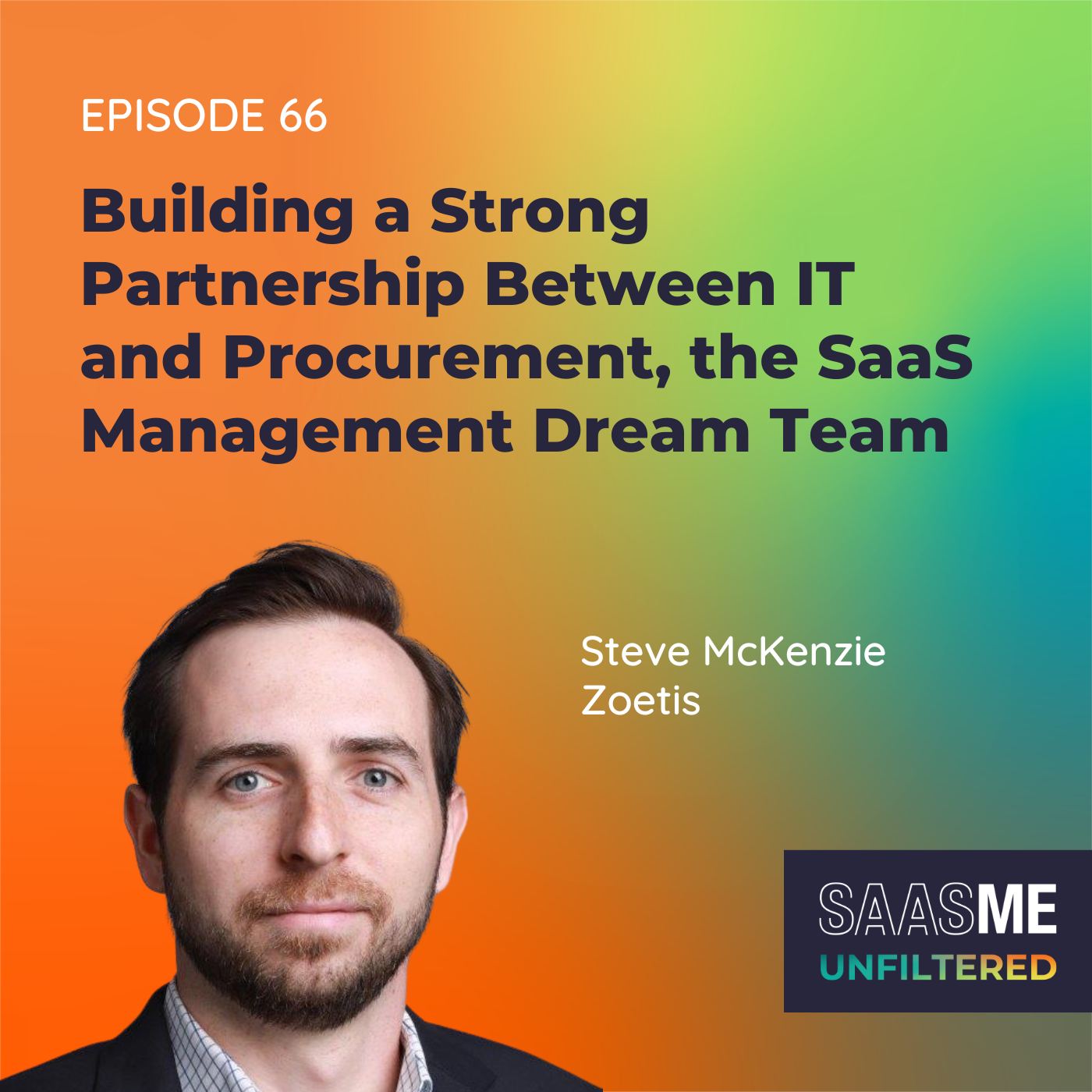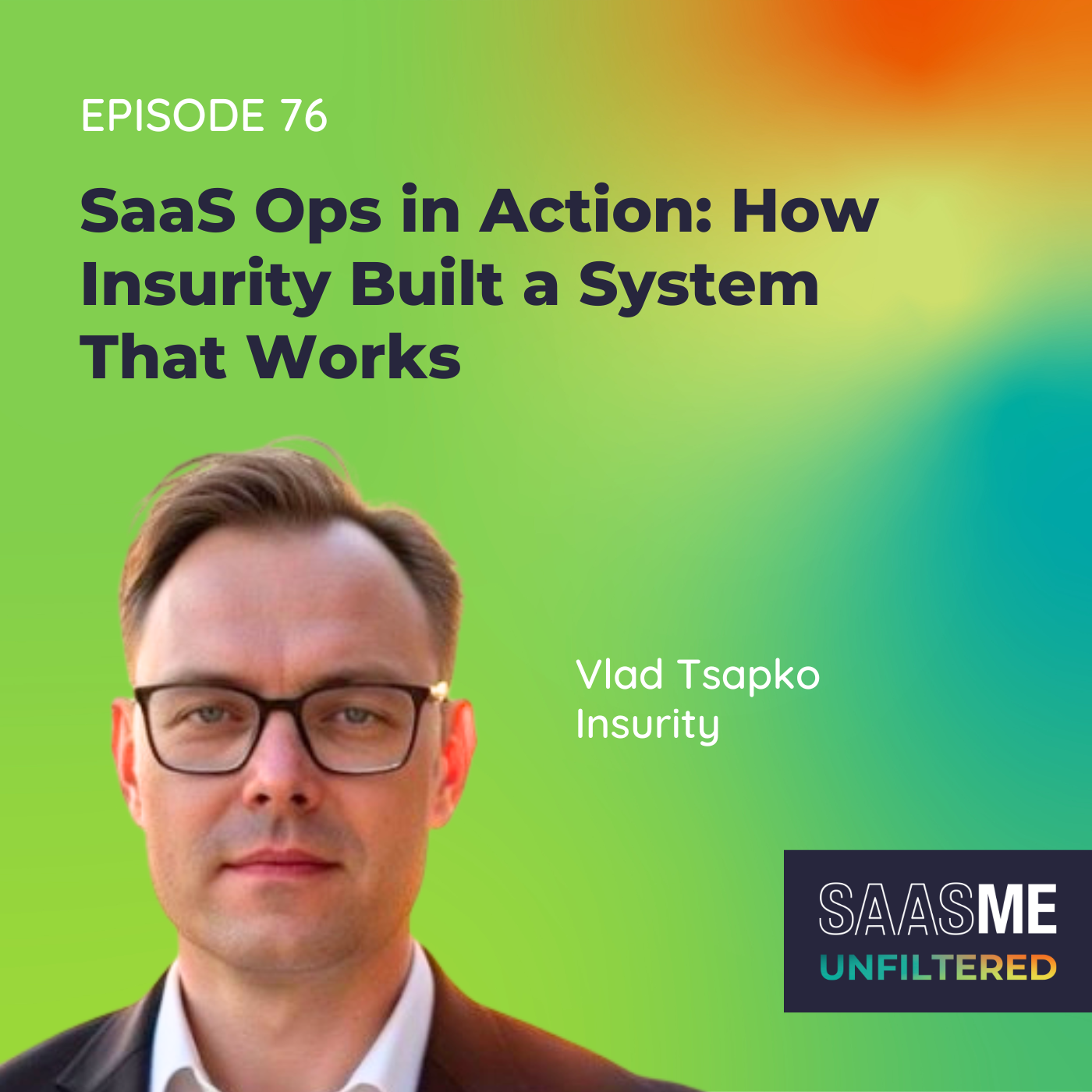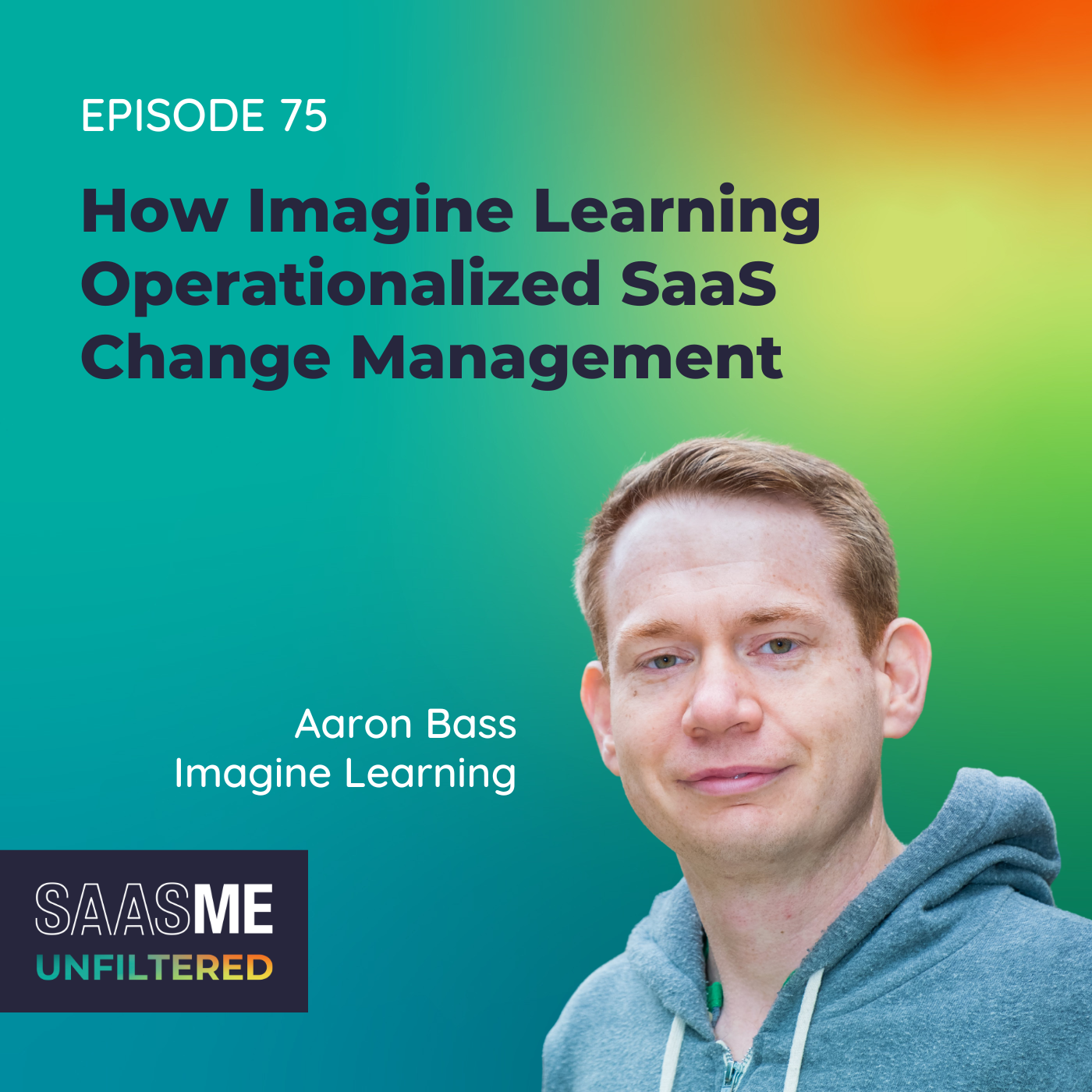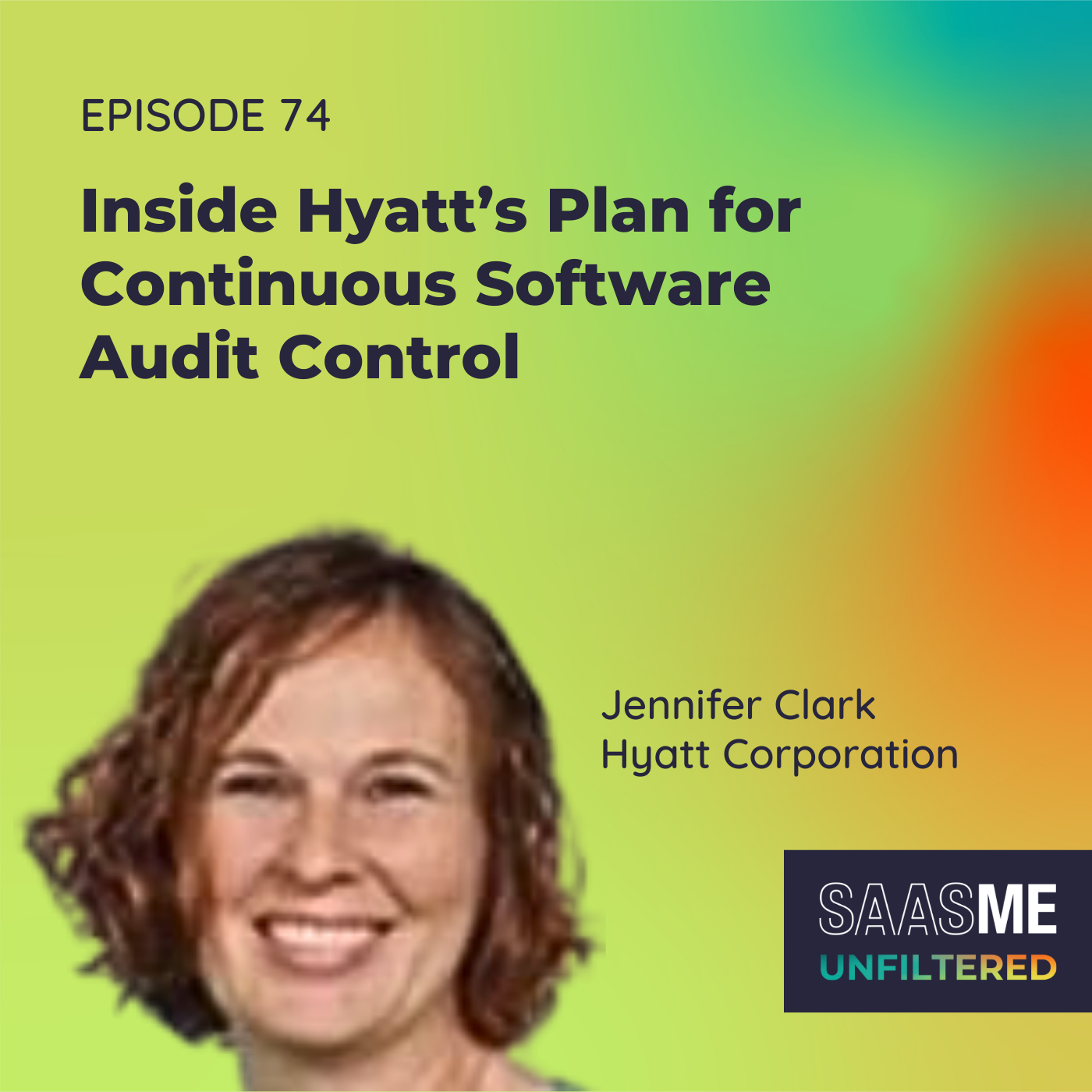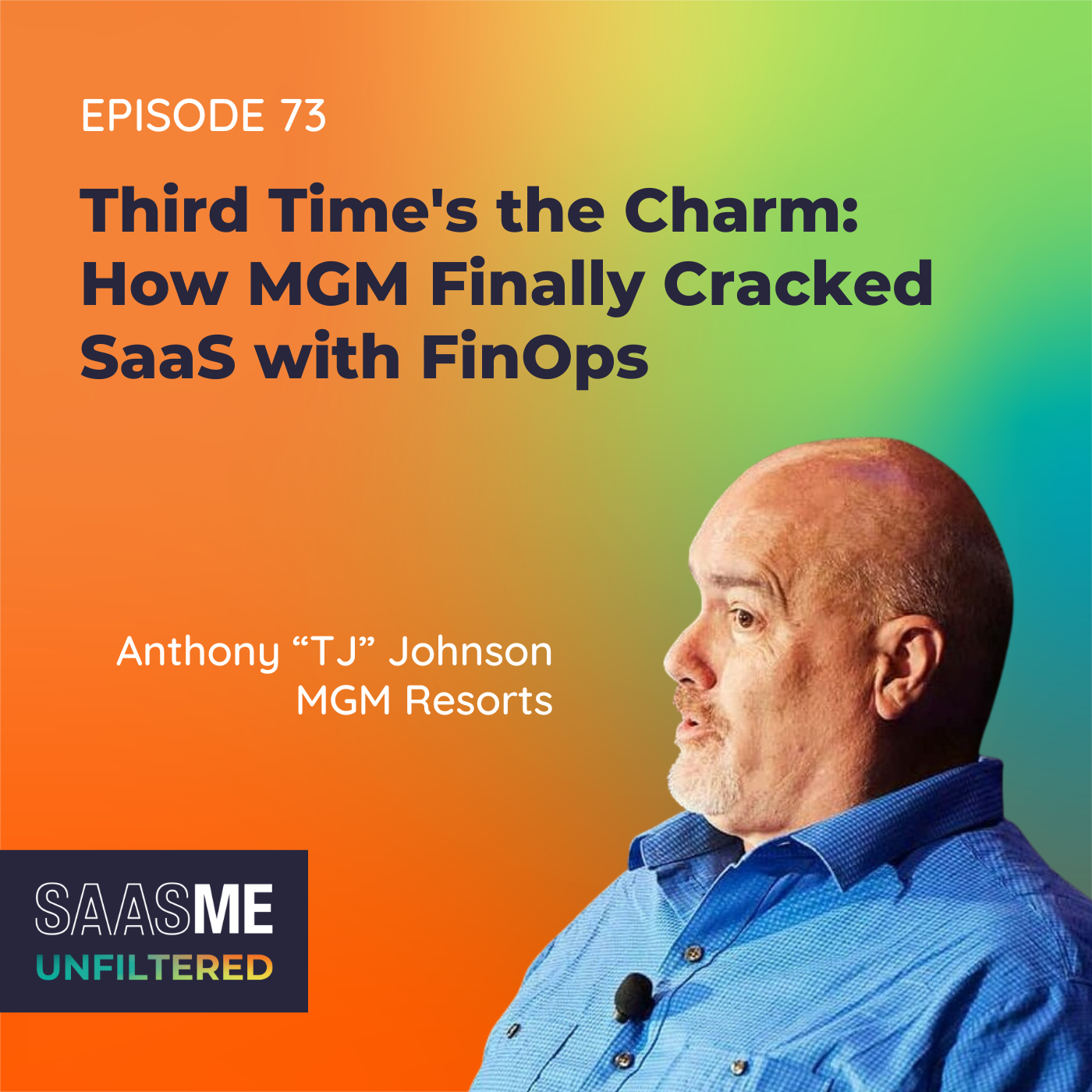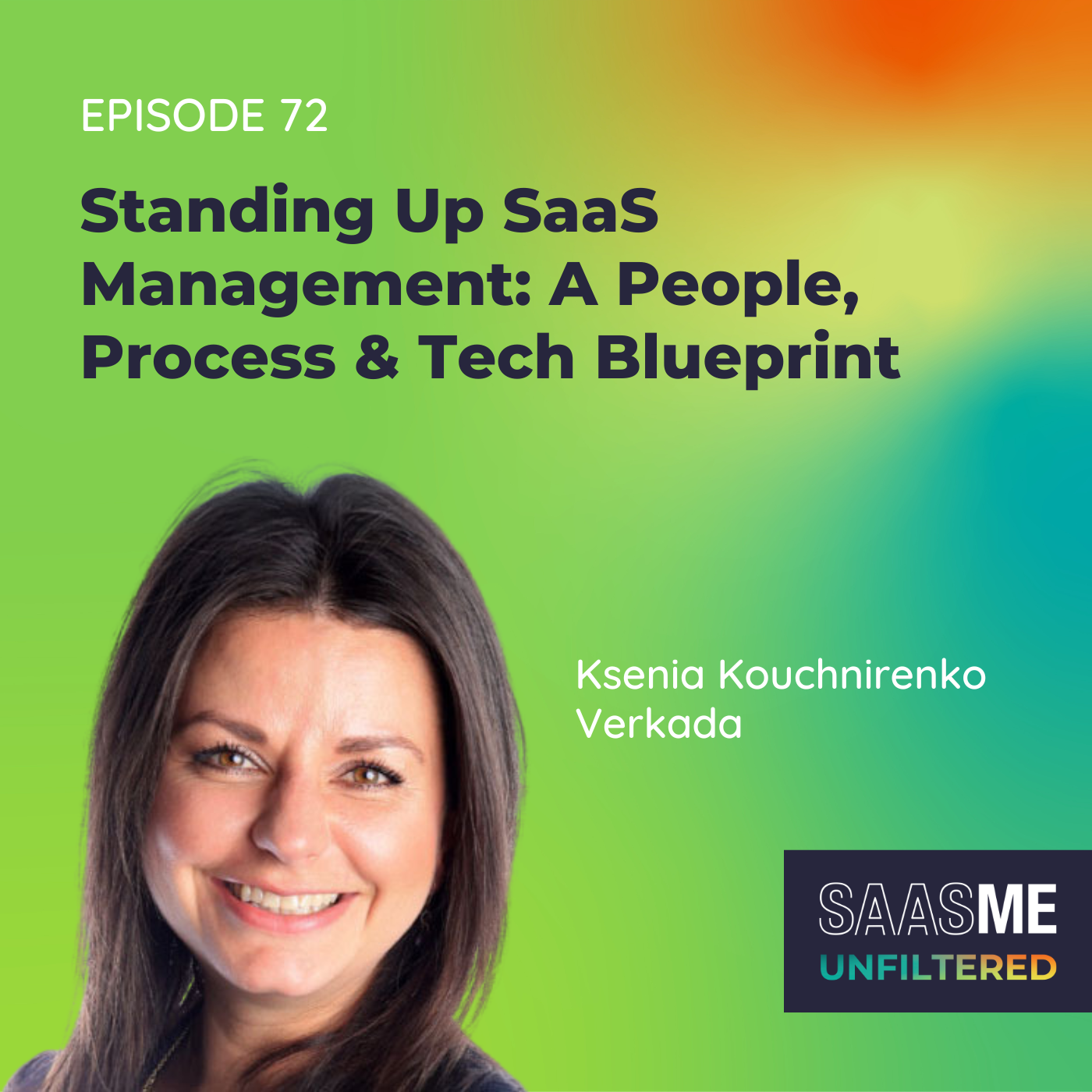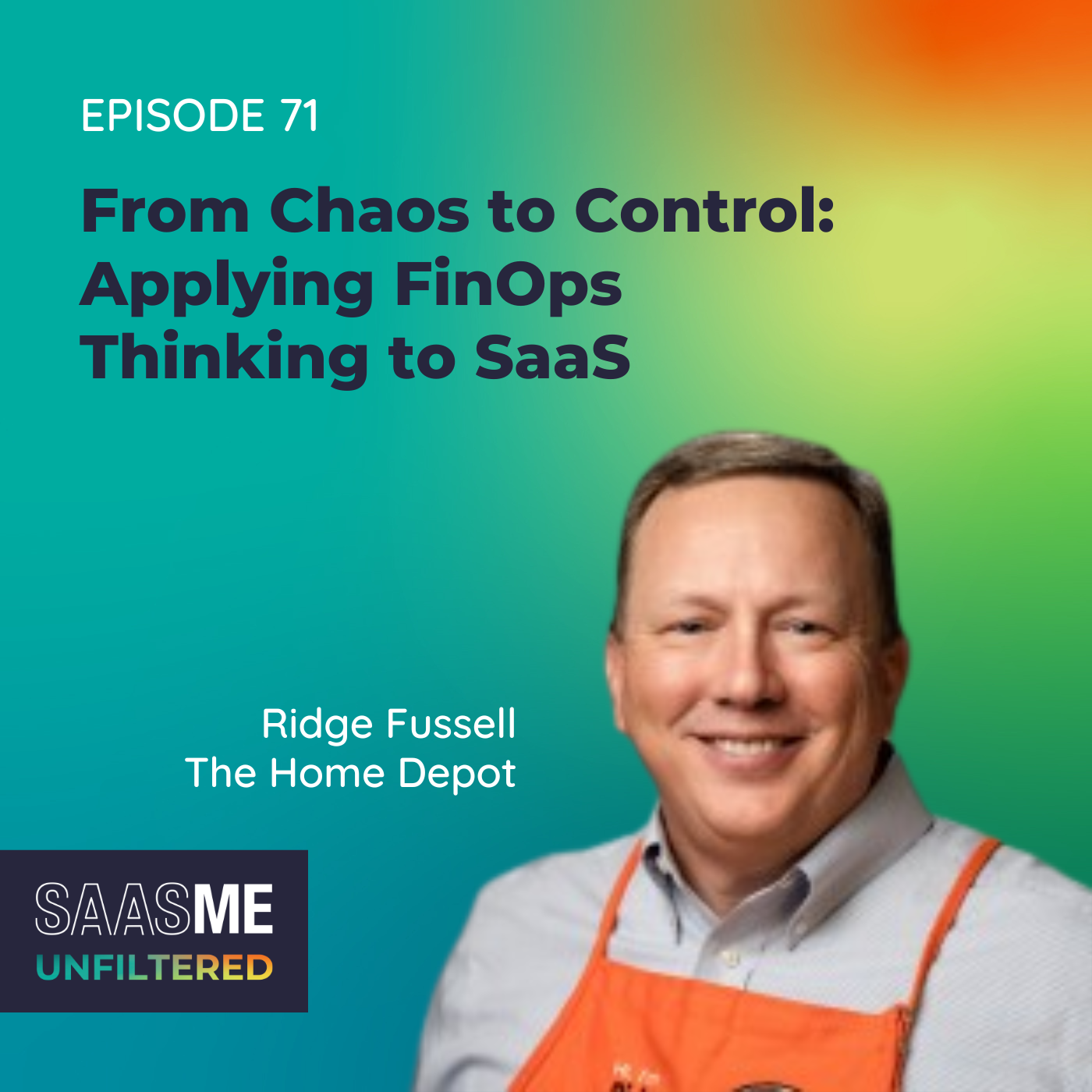Building a Strong Partnership Between IT & Procurement, the SaaS Management Dream Team with Steve McKenzie (Zoetis)
- 0.5
- 1
- 1.25
- 1.5
- 1.75
- 2
Cory: Hello, hello, and welcome to SaaSMe Unfiltered: The SaaS Management Podcast, the show with give it to you straight, real life advice from pros knee- deep in SaaS every single day, SaaS management superheroes just like you.
Meredith: Welcome back, everyone, to SaaSMe Unfiltered. I am thrilled to welcome Steve McKenzie to the show today. Steve is the IT Supplier Management Lead at Zoetis, the largest global animal health company. He has over 10 years of procurement and sourcing experience with other notable stops at KPMG and J. P. Morgan. Now, last season, we had the pleasure of talking with Keith Sarbaugh, the CIO at Zoetis, to get a glimpse into the IT side of managing SaaS and software in the enterprise. So today, Cory and I are very excited to jump in on the procurement side with Steve and talk a little bit about what makes a great partnership between IT and procurement, and why they are the dream team for buying and managing SaaS and software in the enterprise. Steve, we're super excited, welcome to the show.
Steve McKenzie: Thanks for having me, guys, I appreciate it.
Meredith: Well, now Steve, procurement and IT don't always see eye to eye, or maybe it's better to say that they don't always speak the same languages. And that can sometimes cause a lot of friction. But working together is actually so important when it comes to SaaS, so I'd love to get real for a moment and talk about some of the common misconceptions that procurement thinks about IT, and IT thinks about procurement. Maybe, what's the perception versus the reality that you've experienced?
Steve McKenzie: That's a great question, Meredith. I'll speak first from the procurement side. I feel that you go into... It's like that your technology partners have a misconception that you're there to just take and take and take, it's just budget- focused, and leave and be done with it. I just feel that has not been the case in my career so far. Things have changed tremendously in this technology space so long as I've been doing it, even more so in what feels like the past nanosecond with AI. And then, on the other side, procurement professionals sometimes feel like there's a misconception that they just know technology and that they don't care about a contract. And I think it's a disconnect, really, between the two that drive those misconceptions.
Cory: So when you joined Zoetis, you stepped right into a very established and fantastic procurement and IT- driven relationship. I'd love for you to maybe contrast that for our listeners to other stops that you've had, maybe not by name, but where maybe that procurement and IT relationship wasn't already tightly aligned. How has that really helped you jump in, get things done, drive value in a seamless way? And what are those additional outcomes that are enabled because of that relationship?
Steve McKenzie: Yeah, so it's a good point, Cory. While I'm part of our IT department now, it'll be going on just about a year, I did step in and join the team initially on the indirect procurement team. I can't speak highly enought about that team. They're the most seasoned, experienced procurement professionals I had the chance to work with. I learned a ton. But really, again, jumped in right away, thrown into big projects, getting to meet people. And that's also a credit to Zoetis, where we adapt that flat organization mindset, and its titles aside, we're always willing to work together. For me, in my current role, it was hugely beneficial to know the nuts and bolts on the procurement, understand what is the objective of the finance team, of the indirect sourcing team, and bring that over here and say, " Hey, guys. Let's be cognizant of those things so that we can make sure we're always working together, working towards our shared objectives." And that's been huge. And a part of it, too, is, while it's a small and mighty team, it's a small and mighty team. And that's great. You get to know those people. I'll call out Jen Heimall. I work with her consistently, she's our go- to IT procurement contact. We're talking on a daily basis. So we speak the sourcing language and we're always willing to share and collaborate. We're working together on behalf of really not just ETD, but of the company, as well. Yeah, I don't want to discredit any teams I've worked with previously, because it's always something outside of that. Right?
Cory: Yeah.
Steve McKenzie: Have I seen the personal conflict sometimes? Sure, but I could count it on one finger, maybe two at most, if I needed to. It was always, again, something larger, what was going on in the organization. I've been in situations where there was just a lot of turnover at the leadership level, and it caused confusion between, " What are our shared objectives here?" And then, sometimes having the benefit to work in a lot of different industry, I'm reacting to the speed of our clients. I've always been a task- oriented person. I want to make sure I'm meeting that, getting things done in a timely manner, but not letting things fall to the wayside and just trying to get it done for the sake of being done. And that always causes the conflict, too, because you're not understanding of what is the stress of that person in their role, in their team, in their organization that causes that conflict. So it's always being aware of the context, what's going on, health of the company, the direction, understanding, " How does that float down to me?" Because sometimes, I will say, from the procurement side, you feel like a man alone sometimes. You're like, " It's just me working with a few people or a lot of people on this one category." And it's bringing it back to, " What are those objectives? How do we share them? What are my colleagues' objectives? What are they looking to accomplish? How can I support that while also being mindful of my own?"
Cory: Yeah, it's that age- old IT procurement conversation. Do you centralize everything in a procurement organization that may report into finance versus bringing it over and embedding procurement within the IT organization? So I love how that set you up for success. Do you have any use cases? Or what kind of outcomes have you been able to drive to with the IT organization because you are a part of that organization, that maybe you wouldn't have been able to execute in a finance organization or anywhere else; that because you're there, you have seen outsized results? Can you share anything on that?
Steve McKenzie: Yeah. I'll give credit to Zylo. One of them has been where it becomes a capacity game, and especially in our industry, you have just have a ton of software. When you are trying to develop the next best product, it requires a lot more than one even seasoned professional can understand. And that's where taking that mindset, " I don't ever want to negate the work the procurement team does, and I don't want my function, my team, as it develops, to be a shadow procurement function. How can I think this through? How can I help purvey some procurement skillset, some thinking here?" And that's where Zylo helped us step in and build out our renewal calendar, right? It's obviously those big ticket contracts, we understand them, we know them, we track them well. But as I was mentioning, with that long tail- end software, it's allowed us to say, " Hey, you know what, guys? Let's get on a schedule. Let's think these things through." So when we do get engaged with a procurement team, understanding it's not a multimillion dollar, ERP- focused, or business- to- business. Right? " Hey, you know what? We've thought this through. Can we rightsize? What's our roadmap so that when we get there, we're making their jobs easier." And listen, they can just apply their expertise and say, " Hey, you know what? Did you guys maybe think about this one?" I try to cover off those gaps. I don't want to get called out by my old team. But helping convey that mindset, again of, " Let's think all of these things through, best deal, best contract for us."
Meredith: Steve, I'd like to continue on this topic a little bit. You just mentioned the renewals, renewal calendar. How does this partnership with IT really play into operationalizing the management for all of these renewals? There's hundreds and hundreds in an organization your size. What's your approach? How do you stay proactive? How are you thinking about working with IT to really drive that value for the organization?
Steve McKenzie: Yeah. Meredith, sometimes it is really just the simple fact of the data's aggregated in one point. And I'm finding those avenues, to my point before, of understanding the larger context, where if this team's working on executive reviews, how can I bring that forward and say, " Hey, guys. This is what's on the docket, so that we're all aware of it." And it's not trying to ever say, " Hey, somebody within your team's hiding that from you." But they might be handling 20 other contracts. This is a big ticket one that's coming up in the next quarter. So baking that information there, putting it at the fingertips in one place where it's like here I am in my budgeting cycle, in the latest estimates, all of these things, plus I know what's coming up. And it's again, just driving that visibility is the biggest thing, to say, " Hey, you know what? I have this coming up. It wasn't top of mind. Is it as simple as rightsize the contract, align it to our needs?" Or do I need to think, " You know what? I have the time, maybe I need to exit this contract, or I'm going to replace it." So again, it's bringing that information to my colleagues in ZTD to say, " Here it is at your fingertips, baked in that way." And even then, it's just building out, credit to our implementation team from Zylo, just building out those cadences to say everybody is aware of, " Hey, 90 days out, I'm getting a notification from the team that runs TSNA," our team name. They're going to be reaching out and letting me know that this is coming forward. To me, it's almost like you're taking that administrative overhead and just saying, " Hey, I'm going to bring it clear, top of mind. Here's what we see, here's what's going on." And it splits off from there for us, too. Right? My manager also oversees the FinOps, the technology business management end. We're able to then collaborate and say, " Hey, we're seeing a misstatement here where we thought maybe we were really going to get hit hard by an inflation kicker. That's not the case." Great. We can revise, we improve, and it helps us improve all of our metrics. So yeah, for me, that's been the biggest thing of taking that data, bringing it to the team, and not having them have to come and look for it. It's there, it's present, it's top of mind. It's put in front of the right people to be informed to make those decisions.
Meredith: Steve, that's a really very thoughtful approach. What has been the reaction from those other partners that you're surfacing this data, you're bringing them that information? Was it a little bit of surprise or, " Thanks" or, " Oh, my gosh"? What was that reaction?
Steve McKenzie: Yes. Listen, there's not many companies out there with the letter Z, so a lot of people were like, " Is this a typo?" A lot of it was inquisitive, I will say. It's, " Hey, is this new? What's going on?" Maybe that initial hesitancy, but what I will say overwhelmingly was, hey, I could pull out two, three emails where, " Man, this is great. I really appreciate you bringing this forward." " Hey, by the way, here's what I see, just to make sure, do you have these loaded?" " Oh, yeah, I do." " Great, awesome." So I can expect that now, and I see it being baked in for... I can think of one colleague in particular in our risk management team. He showed me the list, it had to be 25, if I was counting, " Hey, we validated quickly yeah, they're there. Hey." He knows now, 90 days out, at a minimum, he's going to see that. It tips off, " All right. Work, cycle, get this through," so he can help manage his team better. It was not resistance, it was people saying, " Hey, what is this? What's going on? How can this help me?" And that's what I love to see. I thought going into it, I'm going to take Zylo, I'm going to empower myself and my team as it grows. We're going to send that information out. I did a complete 180. I'm always willing to admit where I might be wrong. I've met with teams, portfolio teams, getting them in view- only access. " Let's collaborate. Is this right? Am I tracking? Do we have opportunities? Do you see any anomalies that flag for you that we should be working on?" So yeah, it's been awesome to see that response. I even have one right off the bat when we had really put in our renewal calendar into effect. It was just a straightforward email from a colleague, " This is awesome, man. I really appreciate this." Because again, I don't have to try and remember it, clog up my calendar, add it to another task list that's stacked on 20 others on my desk. I now know and have that, that I'll get that notification. Again, I give credit, I have Janelle who joined my team in March. She took it, she ran it daily, she's reaching out, she's getting connected with these people and we're just continuing to cycle it through. And again, it's allowed us to build up a good rapport because we know there's larger use cases out there. We've got to dig in on really our top platforms. We've got the user activity data. We're leaning in, " How can we take manual work away? How can we be prepared for these renewals that are on the horizon?"
Meredith: If you're not unlocking the full value of your SaaS, what are you doing? There is no denying it, SaaS is mission- critical to your company's growth and success. And as the number two operating expense for most organizations, it's your biggest opportunity to save money and drive efficiency. The time is now to do something about it. Join me and your fellow IT, SAM, finance, and procurement leaders at SaasMe. SaaSMe is the industry's only dedicated SaaS management event where you can sharpen your skills, hear from your peers, and learn how to unlock value and responsible business growth through smarter SaaS management. Register today at saasme. com. That's S-A- A- S- M- E. com. Curiosity can be a really great conversation starter.
Steve McKenzie: Definitely.
Cory: And that curiosity, it's such a procurement strategy that you begin with the data. When you begin with data, you are starting objectively. You are removing a lot of unnecessary work, Steve, to what you said, but you're starting with the ground truth. And when procurement brings that data, you are informing, you are upleveling, you are doing the strategy that procurement teams are always looking to drive, which is, be that trusted partner internally and help uplevel the conversation with data. Data is greater than opinion. We love to say that here at Zylo, so I love how you think about that, and that's very tightly aligned to procurement strategies. Transitioning a little bit, Zoetis is a leader in animal health, so it very much makes sense that innovation is a key priority for your business today and ongoing. And the big piece of innovation that most companies are exploring is AI. So how are you partnering with IT to evaluate AI internally at Zoetis? And maybe talk about the positive side of it, the areas that you're looking to make sure that you have governance and control around. How do you manage AI internally in IT at Zoetis today?
Steve McKenzie: Yeah. I will say, Cory, I'm a very satisfied consumer of the team that's really taken AI by the horns here and leading it forward in one of our towers. We're obviously a public company. You can see that it's top of mind for Kristen and for the executive team. We realize it's not a passing thing, that this can be truly groundbreaking in many areas for us as a company. So I think it's something that will become top of mind for a lot of companies soon. The hype cycle for this is far different than CapEx, to the perpetual to subscription, from on- prem to cloud. The past 18 months, it's mind- boggling how quickly it went. And I think where we were probably five years into this SaaS cycle, we're there already, where it's now the reality of listen. Yeah, there's a ton of money, venture capital going into these companies, but there's also some longstanding traditional companies that they've got objectives to meet. And I think that's where rubber meets the road here, it's going to become very real on, there's a price to pay with this. And this is my personal feeling about it is, it's going to happen. Right? So you have to be prepared and say, " AI can't do everything." No matter where you stand, it's interesting where, again, you've got to give yourself room to run with that. But at the same time, you still have software that isn't impacted by AI that you need to run your business. Right? It's interesting. You meet with your publishers, you talk to them. Sometimes you feel like they're throwing it out there for the sake of throwing it out there. But again, you're still going to need your ERP, you're still going to need your CRM tools. You're still going to need your end user productivity tools. How do I manage that? Be conscientious about that. Make sure that's right size, that's being managed well, I'm seeing the value there. And if I can, be as aggressive as possible to give myself and my company the ability and room to run to make those investments into AI. But I know that there's much more groundbreaking work being done with it. But again, there is that looming reality of, again, it is a business at its core. Right? And there's going to be implications to that, so we've got to be conscientious of, if we want to allow ourselves to continue to make those investments, we've got to make sure we're doing a good job with what we have for our core software. How can we bring a platform like Zylo to help you start to monitor that? Are you seeing the buy- in for some of these tools? If everybody came running to the door a year ago in March, are they all still there? Do you see that? And that's the biggest thing. And then, also, there's also a risk piece to it. People are eager for it. Are they finding the soft spot in the process to go out? And I don't think, again, it's anybody being malicious, they want it. What can we do to redirect and make sure that we're keeping ourselves secure, too? Because as with anything, while things are different, it is very much like what we dealt with going from running it in your own data center to running it in the cloud. Right? Your data has to be secure, it has to be protected, even more so in our space, right, when your IP is hugely impactful to your company. You've got to make sure you're reaping the benefits of AI to help you accelerate to meet these objectives, but making sure you're not also opening yourself up to unknown risk.
Cory: Well put.
Meredith: Steve, there's the AI tools that are coming to market. And then, there's the current tools that you already have in your SaaS stack that are maybe starting to add AI capabilities. To your point, everyone is kind of talking about it and throwing it out there. Are you looking at those two types of applications, those two use cases any differently?
Steve McKenzie: It's a good question, Meredith. And I had the chance, I was talking to a publisher yesterday. And right now it's tricky. I think we're more of, you're looking at it from what's coming in. And a lot of it is driven by those you are already doing business with, but then being mindful of when you're hearing that come forward almost, you've got to be a cynic. And is it marketing, right? Because I do have the benefit of I've seen automation, I've seen machine learning and how it benefits. And I was a cynic then where those first vestiges of AI in the early 2010s, I'm like, " This isn't AI." I'm not a coding guy. I took a Java class in high school. This was not for me, but I understood that this is not AI. That's different where it is now. And being again, a cynic where you're hearing that, and is it a push to try and find a new revenue stream? Or is this truly beneficial to us? Yeah, some of it is very pointed, meeting the business use case, and that's driven by our leaders in that space between our business units and our IT teams. Where I see it with our existing ones is just, " Prove it." And listen, I can't name the publisher. They were saying, " Hey, let's get time. Let's talk about this. We want to show you." They were eager to jump into that, and that's where you can take a step back. Maybe they do get it and they understand that this is going to be useful to us, and we should find a way to make that investment.
Meredith: Well, Steve, I want to take a step back, talk a little bit about the procurement profession. The profession itself, it seems to be really moving away from being just a reactive role when it comes to the needs of the enterprise. We've got a lot of procurement listeners that are trying to shift their own narrative. They feel like in their day- to- day that they're still in that reactive. " I'm taking an order and pushing things out." What advice would you give them if they want to look to shift their own story within the business and become that strategic partner, do some of the things that you and your team members at Zoetis are doing?
Steve McKenzie: The one thing, and I see it, I go through my LinkedIn, it's still obviously very procurement focused. And I see that age- old adage, " Got to get a seat at the table." And at some points I saw it and I roll my eyes and it's like, " We're still doing this?" It's still true. Right? Don't give up the fight there. But for me, and putting it into my own professional experience was first off, any relationship needs to be built up. Right? You're not going to walk into one where it's like, " Oh. Wow, Steve. You showed up day one here. Here's everything on my forward- thinking plans for three years." You've got to first say, " All right. If you're coming through those first few pieces, how can I do my job well, provide that value?" I took that mindset coming into this new role of, " Okay. It's going to be a supplier management function, right? We're going to be looking to do things such as better SaaS management. Okay." So I was obviously hugely beneficial to that. How am I providing that renewal calendar, like, " Hey, here's how I can pull this in. Here's how I could take manual work out." Don't be so combative. Yes, you may be viewed as you're just pushing through an order. If you do that well, point out those few things, apply the skillset you have, you're going to start building that rapport. And then, show a genuine interest. It was a pitfall that I had a few years ago in my career of like, " I know I'm a good procurement professional, but I feel like I'm not speaking the technologist language." And I remember going to one of the well- known procurement communities, " Guys, what can I do?" Right? " Short of going out and getting an IT leadership executive MBA or something like that." And it was great feedback from very seasoned people saying, " That's not what you need to do. You need to be doing your job well, showing your value, and incrementally you will get there." And to me, it's also then showing that genuine interest of not going in and saying, " Job done, A to Z, let's get it." Ask those questions. " Hey, I see this is coming up for renewal. Are there any pain points we think we could address? What are those value- adds?" And I came here to Zoetis of, we were going through a lot of business- owned coming into ZTD. We know we have some big transformation work ongoing. " Okay. One- year deals are not beneficial right now." Right? A subscription- based model. They want longevity, they want commitment in term because that helps them with their forward- looking statements. " All right. But what does three to five years look to Zoetis? Does three years work? Do we need to grow in that time?" And asking those questions, and that's where all of a sudden you got the, "Oh, okay. He doesn't know what this piece of financial processing software does down to the finite degree, but he's helping me think longer term on this. How can we get out of a cycle of,'Don't renew this year- over- year, take 3.5- 5%. What do three years look like? What do five years look like? Does it need to be two? What do we need to think about to move backwards from that, negotiate those contracts?" And again, I think that's the biggest thing is show your value. Show your skillset and how it can help your IT partner. You don't have to know their job, they don't have to know your job. But if you find that common ground and you show you're adding that value, you'll go from the perfunctory, " Get me a contract, I need a PO." And you'll move along to, " I'm going to go to Steve because he helped me with this contract." And all of a sudden, again, you're building a rapport and we're thinking long term. Now I'm getting to work with more and more of that team. I'm getting to know that team. I'm getting to meet with the leader of that team. " What's their roadmap look like? How do these things play together?" Where you're going to take your tactical skillset, show your value there, and it's going to continue to grow. You can become a trusted advisor, which I think is the seat at the table one. But then, you want to be that trusted advisor more than I think just having that seat there to have the seat.
Cory: Yeah, Steve, I think that's a great way to think about it. You've always said, " Listen, learn and lean in." And becoming a strategic partner means that you're doing all of those things and truly bringing value without having to feel like you need to be the expert in every single area. So a wonderfully strategic way to think about that. So this has been illuminating. It's been a very fun conversation around that link between IT and procurement. We love to close out each of our episodes with kind of a fun question. So my question for you today is from a personal and a business perspective, what are your favorite apps that you use today?
Steve McKenzie: I'll go personal first. I guess I'm going to say it's the iOS calendar app fed by my longstanding Google Calendar. I have two daughters. They are in many activities. My wife and I also have our own hobbies and interests and many things to do. I've got to balance my job here at Zoetis, supporting my colleagues, being a dad. So that one is hugely beneficial. On the work side for me, it's going to sound, obviously Zylo. Aside from that, for me, it is Teams. I like the ability to communicate in one place, to pull those files in. We work in a distributed world. My colleague, Janelle, part of my team, she's down in Texas. I have a colleague on the other side of my team, she's in Costa Rica. I have another colleague in Florida. My manager is based out of Queens. Right? It's that one place for us to communicate, have our files in one place.
Cory: I think that makes a lot of sense. It's how communication happens now. It's how work gets done. So Steve, thank you so much for coming on and joining us today. I very much believe that that collaboration between IT and procurement, how Zoetis has approached that, bringing those teams together is the path to be able to drive collaborative value rather than cross- functional collaboration that can take a lot longer. So I think you guys have cut the corner there very, very well. You guys are a shining example of how working together can drive that big, big value for your business today. Kudos to Keith and to yourself for everything you guys have done to bring that together. And I really can't wait to see what you accomplish here in the coming year. Did you enjoy the episode? Pass it along to your friends. Subscribe to get notifications for the latest episode. Share your favorite takeaways, and join the conversation on social media using# SaaSMeUnfiltered.
DESCRIPTION
Lloyd and Harry. Buzz and Woody. Romy and Michele. We all love a great dynamic duo. But, what about IT and Procurement? According to Steve McKenzie, the IT Supplier Management Lead at Zoetis, IT and Procurement are the dream team of SaaS Management. In this episode, learn why this partnership is so critical to the enterprise, how to overcome common obstacles to collaboration, and the pivotal role data plays in fostering strategic alliances.
Key Takeaways
- [01:20 - 02:34] Speaking the same language between Procurement and IT
- [02:35 - 05:45] How aligning the procurement and IT relationship has benefitted Steve and his team at Zoetis
- [10:18 - 12:40] Partner reactions and surprise when seeing renewal data from Zylo
- [13:50 - 17:59] Managing AI internally at Zoetis, taking AI by the horns
- [18:01 - 19:49] Two types of tools, AI and current gen, making an investment in the future
- [19:50 - 24:04] Doing things better with SaaS management at Zoetis, doing your job well and showing value, addressing pain points
- [24:07 - 26:12] Steve's favorite apps
About Steve McKenzie
Steve McKenzie is the IT Supplier Management Lead at Zoetis, the largest global animal health company. He has over 10 years of procurement and sourcing experience, with notable stops at KPMG and JP Morgan. Connect with Steve on LinkedIn.
Want more great SaaS Management stories and content? Subscribe to our newsletter: https://zylo.com/newsletter-sign-up/
Today's Host

Ben Pippenger
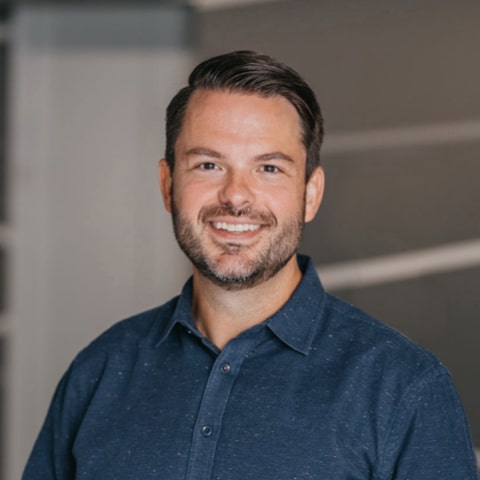
Cory Wheeler

Meredith Albertson
Today's Guests


